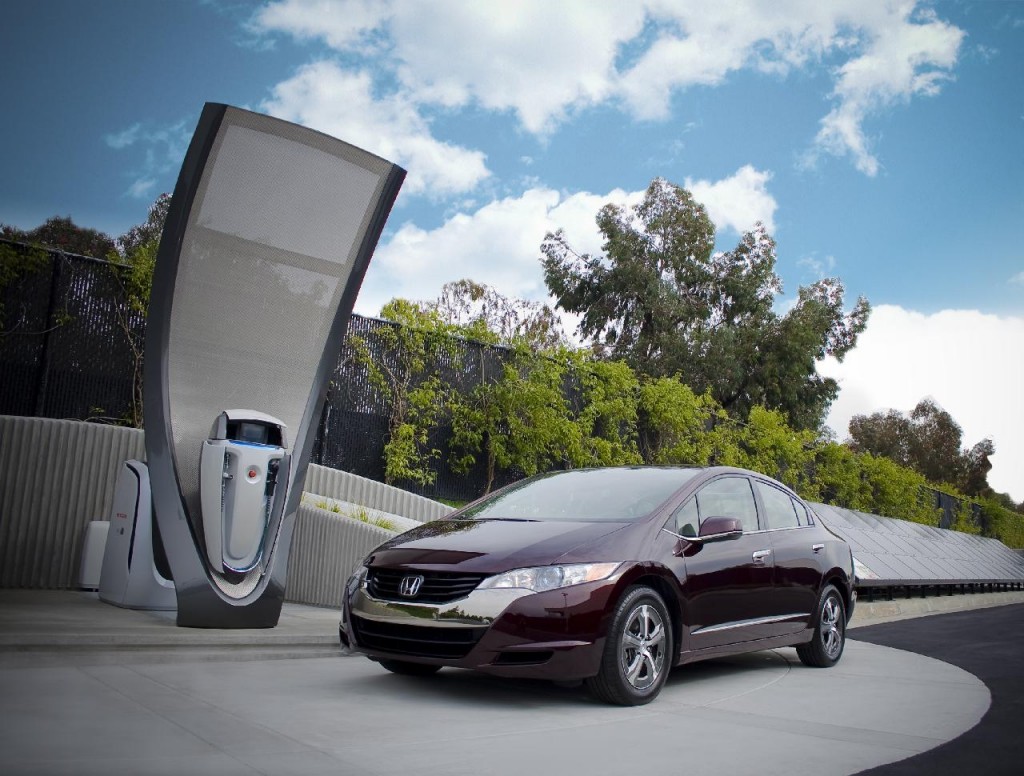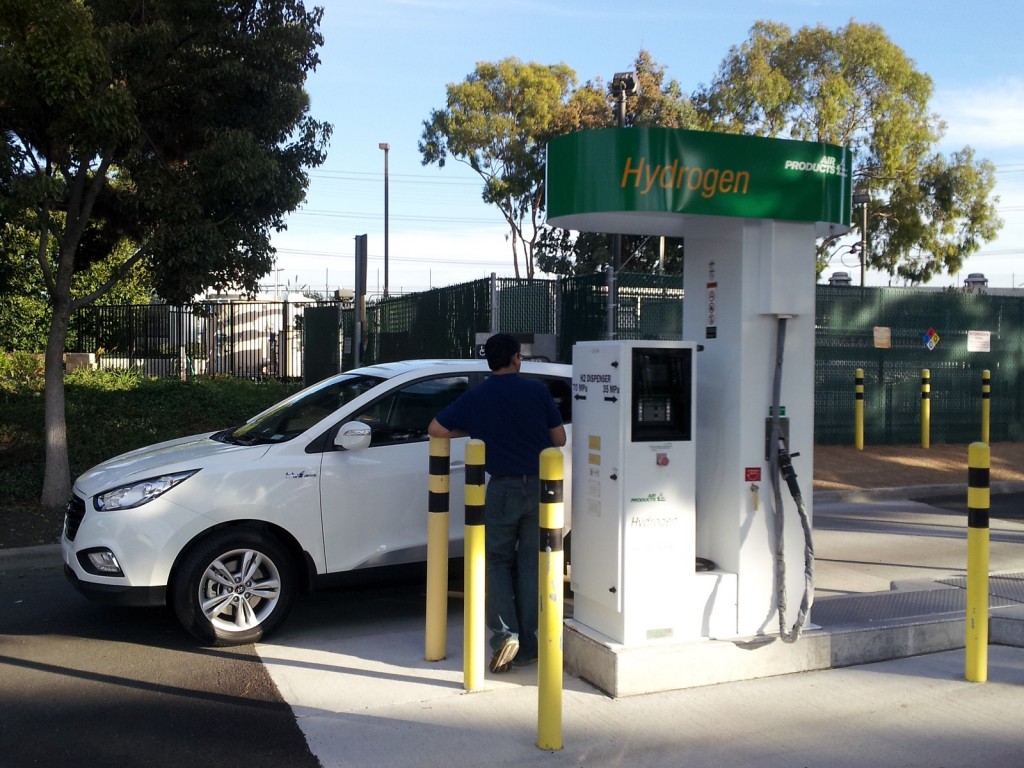
2016 Toyota Mirai hydrogen fuel-cell car, Newport Beach, CA, Nov 2014
As this autumn's launch of the 2016 Toyota Mirai fuel-cell car approaches, its maker is taking steps to ensure that the small number of initial buyers and lessees will be able to fuel up their hydrogen-powered sedans with ease.
Some of the 70 or so Hyundai Tucson Fuel Cell SUV drivers in Southern California have complained that they can't reliable refuel their cars, which they've leased over the last year.
But Toyota notes that those stations aren't "ready for prime time," and wouldn't necessarily be capable of fueling a new Mirai.
DON'T MISS: CA Fuel-Cell Car Drivers Say Hydrogen Fuel Unavailable, Stations Don't Work
In a recent interview published in Forbes, Toyota's Craig Scott notes that "there's still a lot of development work that needs to occur" on a hydrogen fueling infrastructure, and that while it's "vastly improved this year," its development is "still lagging."
"I often say that the infrastructure is a generation behind the vehicle," Scott said. He is Toyota's national alternative fuels manager.
[EDITOR'S NOTE: Toyota contacted Green Car Reports to correct and expand upon Mirai fueling allowances. We've added that material on page 2.]
California now has 48 hydrogen stations planned and funded, with two completed and another eight now under construction. Toyota expects 10 to 15 stations "open and ready" by the end of the year and capable of fueling its Mirai.

Honda Solar Hydrogen Station prototype with 2010 Honda FCX Clarity hydrogen fuel-cell vehicle
Next year, Scott said, he expects roughly 20 more stations to open.
Like Hyundai, Toyota will only offer its Mirai to customers who live and work near hydrogen stations. So far, it has designated only eight dealers--four each in Northern and Southern California--to distribute the hydrogen-powered vehicles.
Scott noted that unlike Japan, where the government is firmly behind the establishment of a nationwide hydrogen fueling infrastructure, the U.S. has no national policy to support and fund such a network.
Japan's efforts, he said, include a "simplified and standardized approval process for permitting, which is something we’re sorely lacking in the U.S."
ALSO SEE: Why Do Fuel-Cell Vehicles Make Electric-Car Advocates So Crazy?
More insight into Toyota's approach to marketing the Mirai and addressing concerns over fuel availability come from Southern California reader Doug Kerr.
The owner of two electric cars, he was invited to a Mirai introduction event in Laguna Beach put on by the carmaker.
The gathering included video presentations, explanations of how a hydrogen fuel-cell powertrain functions, and a half-hour Mirai test drive.
Kerr characterized the event as "low-key and targeted to those early adopters who had the income and the technical interest sufficient to become a hydrogen pioneer."

2016 Toyota Mirai hydrogen fuel-cell car, Newport Beach, CA, Nov 2014
Knowledgeable electric-car drivers, including Kerr, may raise questions about the car and the technology, as Kerr did. He writes:
The Toyota marketing representative, Geri Yoza, was ready for any questions I brought up in the small group I was in.
Regarding the Hyundai Tucson Fuel Cell drivers and their issues with hydrogen availability, she said each of those stations were experimental, and were never considered as part of the consumer experience [by Toyota].
Several hydrogen stations were just finishing construction, she said, and would be available around October. She said the new stations, built by FirstElement, had performance standards, and that they would fill a Mirai within five minutes.
2015 Hyundai Tucson Fuel Cell at hydrogen fueling station, Fountain Valley, CA
On the subject of hydrogen, it turns out that Toyota doesn’t actually provide free hydrogen to Mirai owners for three years.
The limit to those with a lease is $15,000, which works well for lease buyers because they are limited to 12,000 miles a year. For buyers of the Mirai, Toyota provides a $15,000 reduction in the purchase price.
She promised that the cost of hydrogen would be going down; no timetable was given.
EDITOR'S NOTE: After this article was published, Toyota contacted Green Car Reports to correct and expand upon Mirai fueling allowances. The company's Jana Hartline wrote:
You state that we're offering $15,000 off the purchase price of a Mirai. That is not correct. We are offering free hydrogen fuel for three years, up to a total of $15,000, for 2016 Mirai customers.
The new, "ready for prime time" hydrogen fueling stations will all have a Point of Sale system, just as customers expect at gasoline stations. A meter on the pump will display the cost per kilogram, total amount dispensed, and amount of transaction.
We have also outlined the following options for qualified 2016 Toyota Mirai customers:
- Trailblazer APR Support: 0% for 60 months + $7,500 or
- Trailblazer Purchase Support of $7,500 , or
- Trailblazer Lease: $499 per month for 36 months, $3,649 due at signing
The $5,000 California purchase rebate is also potentially available for both purchase and lease customers.
MORE: 10 Questions On Hydrogen Fuel-Cell Cars To Ask Toyota, Honda & Hyundai (Oct 2014)::
Since 1920 or so, automakers haven't had to concern themselves with fuel availability and access--but as makers of several alternatively fueled cars have found, the fueling infrastructure may be as challenging as the cars themselves.

Hydrogen station in Ebina City, Japan
Whether it's electric charging stations, E85 ethanol, natural gas, or hydrogen, building a new and ubiquitous way to transfer energy into vehicles has proven time and again to be deeply challenging, very costly, and usually outside the expertise of large global automakers.
In other words, Toyota has its work cut out for it.
[EDITOR'S NOTE: We gently remind our readers to keep it civil, avoid direct personal attacks and insults, and speak to the marketing, the science, and the technical challenges of the article topic while commenting. Thank you in advance.]
_________________________________________________













